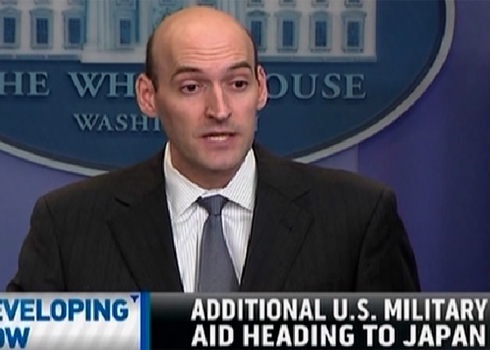President Obama’s plan to overhaul the nation’s energy policy, already beset by strong GOP opposition in Congress and the BP oil spill, is facing a new setback as Japan struggles to prevent multiple nuclear reactor meltdowns in the aftermath of Friday’s devastating earthquake and tsunami.
The President’s call for the government to support a new generation of nuclear power plants as part of his “clean energy” agenda is under intense new scrutiny since several nuclear reactors at multiple power plants in Japan were stricken by a cascading series of natural disasters and other failures.
Obama has called on Congress to approve $54 billion in U.S. loan guarantees for nuclear energy, a three-fold increase, according to a report in Businessweek.
White House spokesman Jay Carney on Monday said nuclear power remains a part of the President Obama’s overall energy plan, and already provides 20% of U.S. electricity. But he noted that the President and his advisers would take into account the fallout and any lessons learned from Japan’s nuclear power crisis.
“Safety is paramount. … We are going to continue to seek to diversify our energy supplies and we are going to continue to take all [the lessons learned] into account,” Carney said, noting that the portfolio continues to include renewables like wind and solar, natural gas, clean coal, as well as nuclear power.
Environmentalists are seizing on the Fukushima fallout as evidence of the continued dangers nuclear power poses.
“The simple truth is that no matter how advanced the technology and how prepared a country might be to deal with a disaster it doesn’t change the fact that nuclear power is inherently dangerous and always will be,” Greenpeace wrote to supporters Monday in a missive criticizing Obama’s federal subsidies for the nuclear industry.
“Tell the President and your members of Congress that there is no place for taxpayer giveaways to the nuclear industry in this year’s budget,” Greenpeace said in the e-mail
Meanwhile, the U.S. Navy has had to move several ships away from the Fukushima Daiichi nuclear power plant after officials learned that the ships and the 17 helicopter crew members had been exposed to low-levels of radiation.
Nuclear Regulatory Commission Chairman Gregory Jaczko called the situation “very serious” but said there was a very low chance that any harmful radiation would travel from Japan to Hawaii, the United States or any other U.S. territories.
“Based on the type of reactor design and the nature of the accident, we see a very low likelihood — really, a very low probability — that there’s any possibility of harmful radiation levels in the United States or in Hawaii or any other U.S. territories,” Jaczko told reporters at the White House.
Jaczko also said that his office has dispatched two NRC technical experts to Japan to help assess and evaluate the nuclear plant damage.
The NRC chairman would not say whether U.S. nuclear plants could withstand the same type of massive 8.9 magnitude earthquake, repeating only that they are “designed to withstand significant phenomena,” such as earthquake and tsunamis.






